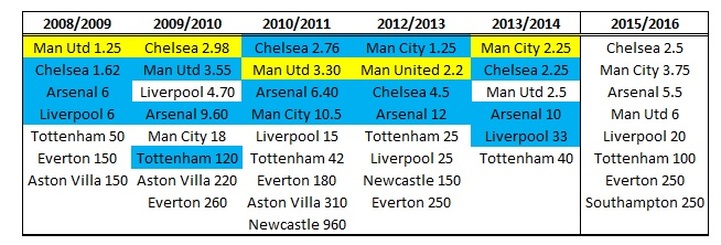Black swans are unpredictable and irregular events. This term was popularised by Nassim Nicholas Taleb in light of his 2007 book The Black Swan: The Impact of the Highly Improbable. In short, the central idea of the book concerns a problem of induction. We make the inference that if all the swans we have seen previously are white, it follows that all swans are white. But generalising from past observations can be dangerous. All it takes is for you to see one black swan and your inference is incorrect.
Maybe Leicester City could be added to the list of examples of black swan events if they manage to win the Premier League? While Taleb argues that black swan events are simply not computable, the markets did price Leicester City from 2000-1 to 5000-1 (depending on your bookmaker) at the start of the English Premier League season. Although we did have a probability of Leicester succeeding, I think it was fair to say that the Foxes winning the Premier League in August 2015 fits into the realm of the highly improbable.
The bookmakers used past events as a guide to future outcomes in August 2015, as they usually do. Below are the market prices to win the Premier League at the beginning of five recent seasons I could get data for. This data was accessed from a range of sources including newspaper guides and gambling websites such as Paddy Power.
As expected the bookies get things right most of the time. In the five seasons shown below either the favourite or second favourite won the Premier League (marked in yellow). The teams marked in blue are the other top three placed teams for that season. In regards to the top 4, once again the bookies get things mostly right.
If they do win the Premier League maybe Leicester's success will be retrospectively explainable? This is a key aspect to idea of black swans. Hindsight is a wonderful thing and the highly unpredictable will be rationalised by commentators. With the wonderful Mahrez, why couldn't they win it?

 RSS Feed
RSS Feed